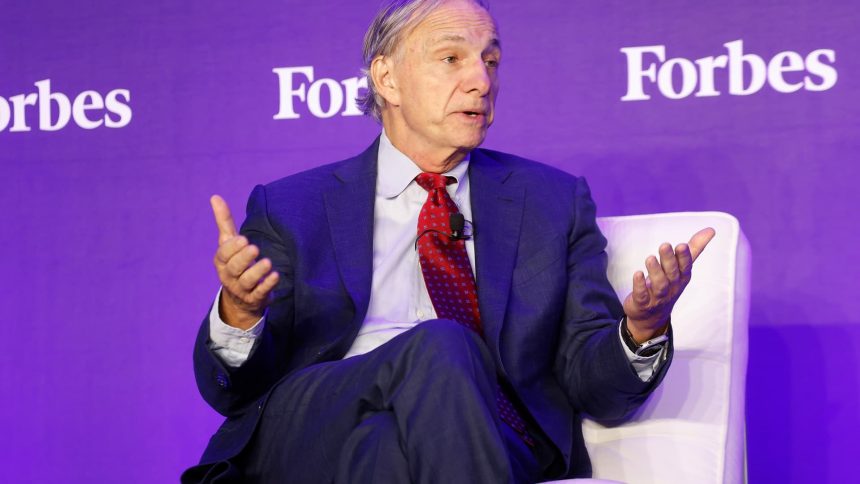ABU DHABI, United Arab Emirates — Amid a turbulent global environment, hedge fund titan Ray Dalio sees one particular part of the world as holding promise for investors: the Middle East’s Gulf states.
The Bridgewater Associates founder specifically highlighted the United Arab Emirates, while speaking during a CNBC panel at Abu Dhabi Finance Week.
“We’re talking today about how the world order is changing, and how the region, the GCC (Gulf Cooperation Council) region is becoming an important region. It’s very classic. It’s a renaissance state. We’re now talking about a renaissance state here that happens within this greater geopolitical and economic environment,” Dalio told CNBC’s Dan Murphy on Tuesday.
Dalio’s Bridgewater Associates is the world’s largest hedge fund, which had $97.2 billion in assets under management as of September 2023, according to the latest annual report by Pensions & Investments.
The UAE “is a renaissance state,” Dalio said. “What I mean is, I look for fundamentally, do you earn more than you spend? So [do] you have a good income statement? Do you have a good balance sheet? Are your assets greater than your liabilities?”
He added, “Do you have a culture in which there’s the development of people and the working together of those people to be productive?,” he continued.
“And number four would be, are you outside of a great power conflict? Are you in the middle of the war? Or are you outside the war? And so, I look at that around the world as to the places I want to invest in, the places I want to be. And this region is very, very attractive and is at the takeoff point for the reasons that were discussed in the other sessions.”
Many economic observers have pointed to the Gulf states, particularly the UAE and Saudi Arabia, as leveraging their oil wealth, geographic location between eastern and western markets, and long-term development plans to become highly attractive spots for both foreign investment and fundraising.
Dubai, the UAE’s glitzy commercial capital, was home to 40 registered hedge funds as of July, more than a third of which arrived in the previous 12 months, according to the Dubai International Financial Centre. The vast majority set up shop in the years following the Covid-19 pandemic, when relatively relaxed rules and financial liberalization reforms ushered in a new wave of foreign investment. The majority of those funds are regional subsidiaries of London or New York-based firms.
Amid higher oil prices in recent years, the region’s mammoth sovereign wealth funds had ever more to spend. The region’s combined 10 largest sovereign wealth funds managed some $4 trillion in early 2023, according to the Sovereign Wealth Fund Institute. That’s more than the gross domestic product of France or the U.K. — and it doesn’t include private money. Saudi Arabia’s Public Investment Fund alone manages more than $700 billion in assets, according to the SWFI.
Those figures and the funds’ willingness to make large investments in advanced industries around the world are drawing visible interest from venture capitalists and startup founders, in sectors such as fintech, digital transformation and renewable energy technology.
Rise of the ‘middle powers’
Geopolitically, the UAE and Saudi Arabia are also among the so-called “middle power” countries, which maintain good relations with both the Western world and heavyweights like Russia and China. This allows them to leverage those relationships to maximize advantages in trade and political influence. The countries have played mediating roles in the Ukraine-Russia war and engage with both the rest of the Muslim world and, officially or unofficially, with Israel, all while avoiding getting pulled into the war raging between Israel and Hamas in the Gaza Strip.
The rise of these so-called “middle powers” in mediating such large-scale conflict signals a new world where players beyond the U.S. and the West can call the shots, and where smaller states aren’t forced to tie themselves to the U.S., Russia, or China.
It’s also key for global positioning, as U.S. influence in the world and the region wanes, Dalio said.
“In the broader sense, you have now a serious war in Europe, you have a serious war in the Middle East, and you have a change in control,” Dalio said. “You used to have a dominant power … the United States would have a greater role in influencing things. Now we’re having a testing of power. And that’s going on in different ways. And so we’re in a period, I think of greater disorder, and then it has its economic implications.”
The financial status, regulatory environment and, thus far, political stability of the Gulf states — particularly their ability to stay outside the fray of major conflicts — are crucial for institutional investors, Dalio said.
“I want to emphasize, as an investor, I would say important things are first to know how to diversify well, to be in those places that have those four qualities I mentioned before — the good income statement, good balance sheet, the civility of the people and (being) the renaissance states that are outside the great conflict states,” he said.
“You’re seeing this renaissance with Gulf countries and so on, to be able to go on and have … prosperity in the region.”
Read the full article here




